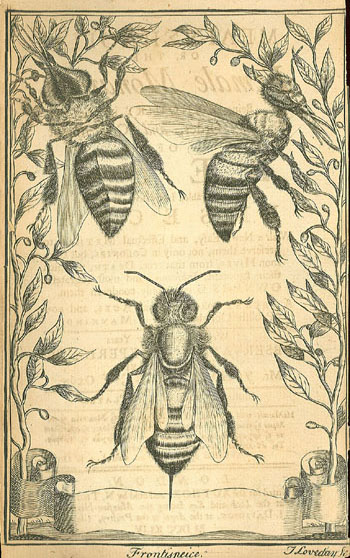April 2
Posted by sydney on Apr 2nd, 2009

Frontsipiece to Thorely’s Melisselogia, 1744
- 1791: April 2, 1791 – Crown imperials begin to blow. Pronged the asparagus beds. Wheat looks well. Mrs B. White & Hannah White come from London.
- 1790: April 2, 1790 – Nightingales heard in honey-lane.
“The Nightingall, that chaunteth all the springe,/Whose warblinge notes throughout the wooddes are harde,/Beinge kepte in cage, she ceaseth for to singe,/And mourns, bicause her libertie is barde.” — Geffrey Whitney’s Emblemes: 1586, p.81 - 1788: April 2, 1788 – Sowed a bed of Onions. Mr Churton left us.
- 1787: April 2, 1787 – Lined the back of the Cucumber-bed with hot dung.
- 1784: April 2, 1784 – No snow ’till we came to Guild-down; deep snow on that ridge! Much snow at Selborne in the fields: the hill deep in snow! The country looks most dismally, like the dead of winter! A few days ago our lanes would scarce have been passable for a chaise.
- 1781: April 2, 1781 – Tortoise out. Timothy weighs 6 lobs. 8 3/4 oz. The beginning of last May he wighted only 6 lbs. 4 oz.
- 1779: April 2, 1779 – Efts appear.
- 1775: April 2, 1775 – Bees resort to the hot-beds tempted by some honey spread on the leaves, & blossoms of the cucumbers. When bees do not frequent the frames, the early fruit never sets well: therefore this expident is very proper for early melons, & cucumbers.
- 1771: April 2, 1771 – Butterflies appear again. Some flies begin to appear. Spring-like day, sharp in the morning.
- 1768: April 2, 1768 – Bombylius medius. Musca bombyliiformis dense pilosa nigra abdomine obtuso, ad latera rufo, longissimum spiculum quoddam ceu linguam ex ore protendit. Ray’s Hist: Insect: p. 273
Notes:
Whitney’s Choice of Emblemes, The Nightingale
The latin passage in the ’68 entry reads, roughly: ‘bombilius fly has dense hair on a rounded body, a long proboscis from which the tongue projects.’ More accurate translations welcome! A lovely photo of Bombilius medius.
Contributor John Brouwer de Koning adds:
On this day in 1791 George Vancouver’s HMS Discovery and HMS Chatham left Falmouth in search of the Northwest Passage. And William Cowper wrote Mrs. Throckmorton, “My dear Mrs. Frog, A word or two before breakfast; which is all that I shall have time to send you!”
 Theme Ported to
Theme Ported to